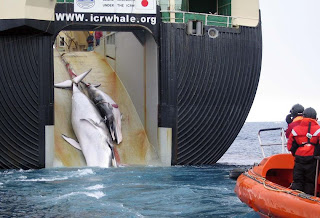Talks to reduce whale hunting collapse
 The New York Times reports: Talks aimed at reducing whaling by Japan, Norway and Iceland broke down today, effectively leaving management of the stock in the hands of the hunters.
The New York Times reports: Talks aimed at reducing whaling by Japan, Norway and Iceland broke down today, effectively leaving management of the stock in the hands of the hunters.Anthony Liverpool, the acting chairman of the International Whaling Commission, told delegates meeting in Agadir, Morocco, that “fundamental positions remained very much apart,” The Associated Press reported.
Delegates of the commission’s 88 member governments had been discussing whether to maintain a 24-year-old moratorium on commercial whaling. A 10-year compromise plan proposed by the United States and other antiwhaling nations would have allowed the three countries to resume commercial whaling, but at significantly lower levels and under tight monitoring.
Whaling in Antarctic waters, where Japan hunts hundreds of whales each year, would have been sharply curtailed. But that became the major sticking point in the talks. Delegates said that Japan and antiwhaling nations could not reach agreement on the size of the catch and that Tokyo had balked at agreeing to eventually phase out the hunt altogether.
Discussion of the “peace plan,” as it had been dubbed, might be extended for another year, some delegates suggested, and the commission will continue to discuss other matters for a few days more. But with the failure of the talks, the whaling nations will continue using loopholes in the moratorium to set their own quotas. The three whaling nations have caught thousands of whales since the mid-1980s.
“Some have claimed that the I.W.C. is dysfunctional and on the verge of collapse,” Peter Garrett, the Australian environment minister, said in a speech to delegates in which he noted the impossibility of a compromise. “We do not share this view.”
Australia is suing Japan at the International Court of Justice to end the hunt in the Southern Ocean, the Antarctic area that is a major feeding ground for four-fifths of the world’s whales.
Environmentalists put the blame squarely on Japan. Susan Lieberman, director of international policy for the Pew Environment Group, said Tokyo has played “the most active role” in heading off marine conservation measures this year, including the defeat of proposals at a United Nations endangered species conference in March to safeguard Atlantic bluefin tuna, several species of sharks and coral.
Junichi Sato, the director of Greenpeace Japan, said in a statement that it was “time for real political action and consequences to be brought to end Japan’s bogus scientific whale hunt in the Southern Ocean Whale Sanctuary, and the commercial hunts of Norway and Iceland.”



Comments